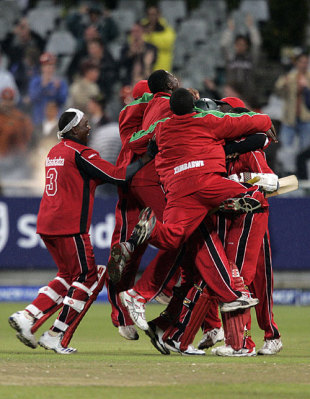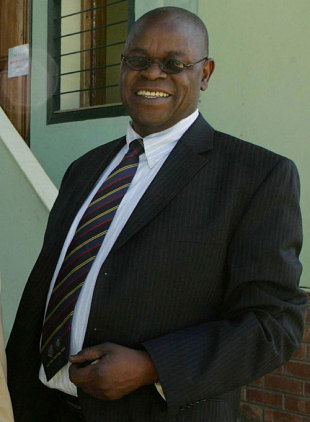Glimmers in the gloom
|
|

|
There was no doubt that 2007 was a much better year for Zimbabwe cricket, but then again, the only way was up. On the field there were moments of joy, none more so than the amazing win over a complacent Australia in the ICC World Twenty20, but behind the scenes there was still too much politics, too much infighting and too little investment in the future.
The overall stats make poor reading. Of 14 ODIs in 2007, two were won. Bangladesh were well beaten in Harare in February, and although Zimbabwe lost the series 1-3, the margins in two of their three losses were close. The second success came against West Indies in November, again in a series defeat.
Aside from their excursions to the World Cup and the ICC World Twenty20, Zimbabwe didn't manage to play overseas, but they failed to make the most of home advantage either. Sandwiched in in August was a politically-advantageous but uncompetitive three-match drubbing by South Africa.
The World Cup was a predictable letdown. Zimbabwe opened against Ireland, on paper their only real chance of victory, and managed to spectacularly blow a winning position when they needed 19 off six overs with five wickets in hand. That tie eventually allowed Ireland through to the Super Eights, while Zimbabwe slumped to heavy defeats against West Indies and Pakistan, and elimination.
One important result was the jettisoning of the ultra-cautious Kevin Curran as coach in the autumn and his replacement with Robin Brown. Curran too often seemed preoccupied with avoiding heavy defeats than ever pushing for victory, and rumours were rife that many players did not see eye-to-eye with him. In Brown they found someone who allowed them to play their natural game, and the upturn in results and more confident performances was almost immediate.
Some old faces returned during the year, the most high-profile being Tatenda Taibu, the one genuinely class act in the current side, who put behind him disagreements with the board and resumed where he had left off. Another rebel, Ray Price, also eased back late on.
At home, at least the Logan Cup, the major domestic tournament, took place - it was embarrassingly shelved in 2006 - and Kenya even sent a development side to compete. The quality of the cricket was too often mediocre and some of the grounds were simply not up to par. The national club competitions also rumbled on, but standards were roundly lambasted and many sides were little more than school XIs.
At the ICC conference in June, Zimbabwe opted to extend their sojourn from Test cricket. The reality was that they had little choice. Unable to compete at one-day level, the much discussed ethos of Test cricket would have been trashed by their readmission. That get-together in London was overshadowed by leaked comments from Malcolm Speed, the ICC chief executive, in which he savaged the Zimbabwe board's accounts. While the pro-Zimbabwe block on the ICC executive ensured that those details were airbrushed over, an independent forensic audit of the books was ordered. The result of that is still not known.
New man on the block
Only in Zimbabwe can a 21-year-old be almost a veteran, but Brendan Taylor has been in and out of the side for four years. That he has talent is unquestioned, but too often his own indiscipline has let him down, and his form was not helped by having to stand in as wicketkeeper during Taibu's absence. In May 2007 he stuck two fingers up at the board's order not to play abroad and headed for Europe. It was hardly his first brush with authority. But in August he sauntered back, and weeks later played a breathtakingly mature innings to help beat Australia. Ricky Ponting said that he wished Australia's top three had batted like Taylor. If he can control himself off the field, then he could go far. It's a big if.
|
|

|
Fading star
Peter Chingoka, international cricket's senior administrator, has used his friends within the ICC to survive some intense flak in recent years, but his time appears to be running out. Serious questions over his role in accounts described by Speed as "deliberately falsified" rumble on, and there is a growing suspicion that he has gone from being a real asset to Zimbabwe within the ICC to a growing liability. On the personal front it's been a bad year for him as he was barred from entering the UK in October because of his political affiliations with the Mugabe regime. With some of his family based in the UK, it was widely thought that was where he would settle when his tenure within ZC ended.
High point
The scenes of delirium in Cape Town when Zimbabwe bloodied the noses of the Australians in their opening match in the World Twenty20 in September will live in the memory for a long time. And it was no fluke. Australia paid for an almost cockily laidback approach to the new competition, and Zimbabwe outplayed them in every department. Only in the final overs, as Ricky Ponting grew increasingly flustered, did Australia look like hauling Zimbabwe in, but Taylor kept his head and Zimbabwe scored the 12 they needed off the last over with a ball to spare. One swallow doesn't make a summer but it sure makes you feel better about the world.
Low point
Zimbabwe Cricket. While most countries rely on their boards to foster the game, ZC often seems to be at war with its stakeholders and players. Despite having banished anyone critical of him, Chingoka remains under almost constant sniper fire, and the accounts affair could be the chink in his armour. The low of the year came when ZC banned anyone other than hand-picked appointees from attending the AGM, lest they pose any difficult questions. That meant that several life presidents and vice-presidents were unceremoniously stripped of their offices just because the honour entitled them to attend the AGM. That almost all of them were former colleagues of Chingoka mattered not a jot.
What does 2008 hold?
A tough call. Performances have certainly improved under Brown and there is a solid core of players who are learning all the time in one-day cricket. It is unlikely they will win a series, but if they can be more competitive and nick the odd win here and there, then that will rightly be seen as progress. They are as far away from regaining Test status as they have ever been, and it would be a huge mistake to expose them to five-day matches, as they simply lack the bowling skills or the batting technique to cope. Off the field, Chingoka and his unloved sidekick Ozias Bvute may well finally depart, but it is possible that those replacing them will be even more unbending. Worryingly, the year ended with rumblings about hardliners seeking to play the race card once more. In Zimbabwe, however, cricket is dependent on what happens in the country itself, and so 2008 promises to be another very hard year.
Steven Price is a freelance journalist based in Harare
